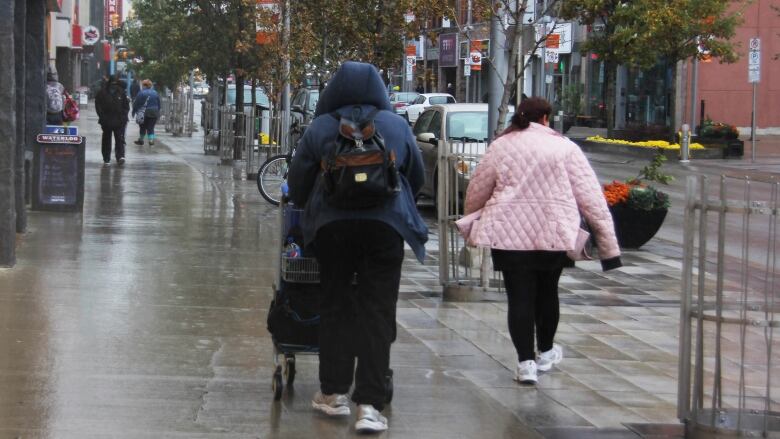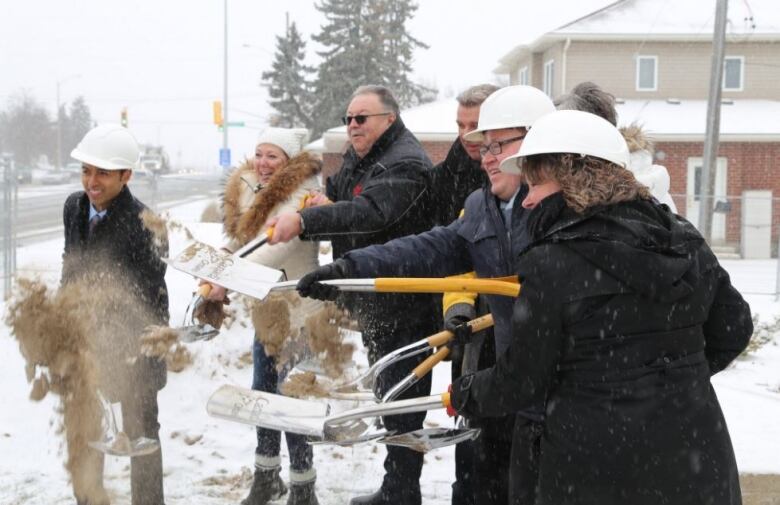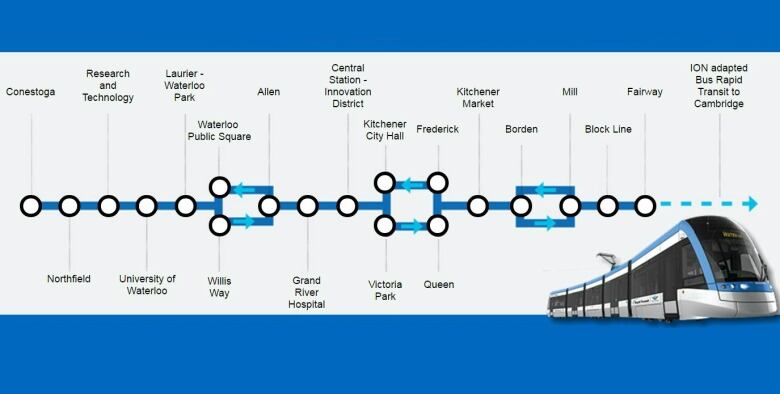'We're pushing them away': Why affordable housing is needed along LRT line
Region says it can encourage, but not mandate, developers to create affordable housing

The Region of Waterloo needs to do something now to ensure there is affordable housing along the LRT route, poverty advocates say.
As more and more underutilized and vacant spaces along the light rail transit lines are earmarked for development, local policy makers need to make sure the region's poorest residents aren't forced to live further away from the cores of the cities and the services located there.
- $8.4M towards affordable housing in Waterloo region
- Low income, cooler housing market drive high consumer debt
The dowtown cores are often where social service officesare set up to help the most in need,says Regan Bruss of the group Alliance Against Poverty.
"It's really important [transit is] available to those on low income. As we're pushing them away from that central line, we're basically forcing them to travel a larger distance to gain the supports that they need," Bruss said.
Listen to the whole interview withReganBruss:
'Space for everyone'
In June, the Dutch capital of Amsterdam made a commitment to more housing for low and middle income residents. New construction in the city must be 40 per cent for social housing, 40 per cent for those whose earnings put them in the middle-income class and 20 per cent can be fore expensive rental and housing properties.
"If we leave it to the [real estate] market, people with low or middle income cannot live in Amsterdam," Dutch politician Laurens Ivens said in a release about the change in housing policy.
- If Toronto wants to keep families downtown it'll take hard work, amenities
- Canada affordable housing organization calls for more London applicants
"With the current building pace, and if housing co-operatives reduce the sale of social housing, the 40-40-20 scheme provides 20,000 social housing rentals for the low income groups. But also the 40 per cent for middle-class homes is another huge extra investment," he said.
"Thus, we keep Amsterdam a mixed city with affordable housing and space for everyone."

Social geography shift
Amsterdam's approach is an idea that could work in Waterloo region, says Brian Doucet, associate professor in the school of planning at the University of Waterloo.
The LRT creates "a huge opportunity to really rethink about the direction in which the region's going to go in the years and decades ahead," Doucet said.
"There is, I think, a real danger in the years and decades ahead that people who are currently living along the line, or even people who need to live close to good transit to access various kinds of jobs whether they be service sector jobs, or lower-wage or minimum-wage jobs won't have access to the housing that's going to come along this line," he said.
It will no doubt change the social geography of the region if plans are not put into place to keep housing options along the line diverse, he said.
Listen to the interview with Brian Doucet:
"As the LRT attracts investment, as it increases people's mobility, these areas will become very attractive and desirable places to live and they will, I think, in the future become some of the most prestigious neighbourhoods within the region," he said.
Many developments are in the planning stages or will be shortly, so the time to act is now, Doucet said.
"Once its developed, these buildings will be with us for 20, 30, 40 years, more down the line," he said.
"What happens in the next few years will determine the outcome of the geography of the region for many decades to come."

Developers incentives
Creating those kinds of social-impact rules around development is not as easy as it sounds, Region of Waterloo Chair Ken Seiling says.
"I don't think we quite have that legislative framework here in Ontario," Seiling said of being able to mandate social housing the same way Amsterdam did.
Instead, the region offers incentives to developers to create affordable housing and those incentives means the region is probably one of the top municipalities in terms of getting affordable and social housing built, he notes.
We've seen a lot of the downtown core experience some gentrification and I think we're going to be seeing that expand...-Regan Bruss,member of Alliance Against Poverty
"Admittedly, it's not enough. Our waiting lists don't get any smaller but at least we're creating hundreds of units every year, whether through subsidy or through building with non-profit and other groups," Seiling said.
He noted they are hopeful the developer of The Hub in downtown Kitchener the large development of a transit station integrating bus, LRT and inter-city trainsthat also has space for housing, retail and offices will include affordable housing.
"That will really be dependent on the developer of the site but we certainly want to encourage that sort of thing," he said, adding the region is always advocating for affordable housing.
"We've been very aggressive in dealing with that; however, there's much more to be done and I think that is a challenge in the future."
Listen to the interview with Region of Waterloo Chair Ken Seiling:
Support the poor
Bruss would like to see more concrete answers to help the poorer residents in Waterloo region.
Her group has called for the region to make public transit free for lower-income residents they launched a petition calling for just that last month but Bruss said they feel stonewalled by the region.
"We don't get feedback," she said. "We're not being heard."
- Region of Waterloo expands eligibility for Affordable Home Ownership Program
- Developers may receive incentives in Kitchener affordable housing plan
She said the group is never asked to comment on housing developments along the LRT lines.
There is no doubt in her mind low-income residents will be pushed out of their homes along the LRT and that it's going to happen sooner rather than later.

"In the last few years, in the last while, we've seen a lot of the downtown core experience some gentrification and I think we're going to be seeing that expand along the line of the LRT at an expedited rate," she said.
Meanwhile, she added, "the demand for affordable housing in our area is not diminishing it's increasing."
She said the region needs to start listening to these kinds of concerns because ignoring it will only hurt the residents who need the most help.
"I would like to see (the region) looking more at matching the public transit services with those who actually need them as opposed to focusing on a target market that doesn't necessarily exist right now," she said.
"We need to be supporting the poor in our area instead of trying to draw people in through light rail transit. Let's make the services we have right now affordable and that will help stimulate the growth."












_(720p).jpg)


 OFFICIAL HD MUSIC VIDEO.jpg)
.jpg)



























































































